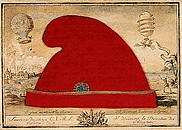Understanding society: a better social ontology. The example of French Revolution En ligne
Daniel Little, philosophe de l'Université du Michigan-Dearborn, nous propose une réflexion en matière d'ontologie sociale à propos de la Révolution française. D'un point de vue méthodologique, il écrit : "The social world is not a system of law-governed processes; it is instead a mix of different sorts of institutions, forms of human behavior, natural and environmental constraints, and contingent events. The entities that make up the social world at a given time and place have no particular ontological stability; they do not fall into 'natural kinds'; and there is no reason to expect deep similarity across a number of ostensibly similar institutions – states, for example, or labor unions. So the rule for the social world is heterogeneity, contingency, and plasticity". Il prend alors l'exemple de l'ontologie sociale propre à l'historien français Albert Soboul, dans le but d'arriver à une sorte d'inventaire des concepts ontologiques de la Révolution française dont il donne une liste non exhaustive: "events, individuals, structures, mentalities, processes, conditions, patterns, and technologies".

